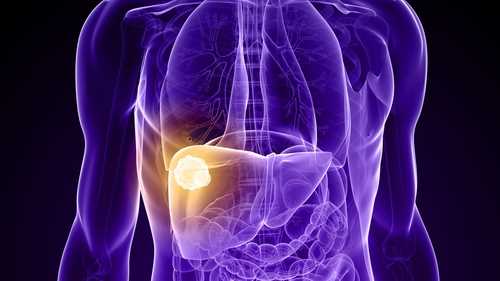Updates on the Ruesch Center’s fight against Biliary Tract Cancers
By Marion Hartley, PhD and Aiwu Ruth He, MD, PhD

Biliary tract cancers (BTCs) are rare and often not diagnosed until patients are in the advanced stages of the disease. Advanced BTC has usually grown beyond the possibilities of surgery, and chemotherapy provides limited benefit to patients.
Beyond standard chemotherapy, we turn to more personalized therapies for BTC. However, these therapies usually require a tumor tissue biopsy for molecular or gene mutation testing, and patient BTCs are often hard to access for tissue biopsy purposes. So, we must find a way to obtain sufficient tumor tissue for molecular analyses or find an alternative method to test for mutations. In collaboration with Dr. Seema Agarwal, a scientist at Lombardi Cancer Center, Dr. Ruth He and others are trying to collect enough cancer cells from patient blood for these molecular analyses.
Despite the obstacles described above, the research world has made some headway in treating BTCs; some successes have been seen in the targeted and immune therapy space. More is needed, and one approach is discussed here: taking advantage of specific cancer DNA damage repair (DDR) deficiencies caused by genetic mutations.
There are different types of DNA damage and different ways this damage can be repaired. One DDR mechanism, “homologous recombination repair” (HRR), is particularly relevant to cancer treatment. In some cancers, including 28% of BTCs, a mutation in a specific gene related to HRR can block the repair of DNA damage caused by specific treatments, forcing the cells to take an alternative repair route. If this alternative repair route can also be blocked using a targeted drug, the cancer cell dies. Therefore, tumor HRR deficiencies can benefit a patient if 1) the treating physician tests for and finds an HRR gene mutation in the patient tumor and 2) a drug is available to block the alternative repair pathway.
The best-known HRR gene is BRCA, and BRCA1 and BRCA2 mutations lead to HRR defects called BRCAness. Tumors with mutated BRCA are more sensitive to certain chemotherapies. However, the protein family poly-ADP ribose polymerase (PARP) can bring about alternative repair pathways, meaning that mutated BRCA is not fatal for the tumor cell unless PARP is blocked. Luckily, PARP inhibitors (PARPi) do just that, and PARPi are used clinically in patients with a range of BRCA1/ mutated cancers. In BTC, BRCA-mutant tumors occur at a rate of < 5%. In this 5% of patients, PARPi may be highly effective.
As the research community understands HRR better, it is becoming clear that several other genes in the HRR pathway might be targetable. Advancements in molecular profiling techniques, ways to study HRR pathways, and the availability of therapeutic agents targeting cancers with faulty HRR make this an ideal time to study these faults and how to use them to benefit patients. In patients with BTC that contains an HRR gene mutation, targeted therapy offers exciting new treatment options, as explored by Yin et al.1
These Ruesch researchers believe that PARPi and other HRR-targeted therapies have a place in the treatment of patients with BTC. Dr. He encourages clinical studies that redefine and expand the qualification of patients for drugs targeting mutated HRR genes and explore strategies to boost the
effectiveness of these therapies.
https://www.mdpi.com/2072-6694/14/10/2561
1
Yin C, Kulasekaran M, Roy T, Decker B, Alexander S,
Margolis M, Jha RC, Kupfer GM, He AR. Homologous
Recombination Repair in Biliary Tract Cancers: A
Prime Target for PARP Inhibition? Cancers (Basel).
2022 May 23;14(10):2561. doi: 10.3390/cancers14102561.
PMID: 35626165; PMCID: PMC9140037.
